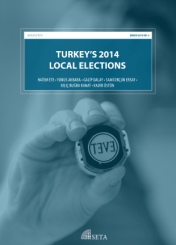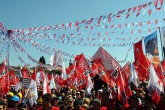Turkey’s election year with three upcoming races is in full force. Local elections on March 30th and the presidential elections scheduled for August 14th will determine the course of Turkish politics in the years ahead. At such a critical turning point for Turkey, this study is meant to provide a short overview of the standing of the political parties and an analysis of three major issues (Kurdish peace process, Gezi Park events, and the AK Party-Gülen rift) that will be determining factors for the outcome of the elections. While no big surprises are expected from the local elections, the perception of success or failure of the ruling party will have an impact on its calculations with respect to the presidential election and the parliamentary election in 2015.
In a highly polarized election atmosphere, parties tend to focus on particular issues and appear caught up in short-term political fights. The resolution of the Kurdish issue, drafting of a truly civilian constitution, and further democratization of the political system as a whole remain the most significant institutional and structural issues for Turkey. Regardless of what happens in the upcoming elections cycle, parties competing to run the country will have to come up with a comprehensive agenda and a viable strategy to resolve these issues.
In this article
- Analysis
- Domestic Policy
- 2014
- 2015
- bdp
- Elections
- Istanbul
- Kurdish Community
- Kurdish Peace Process
- Kurdish Question
- Local Elections
- March 30
- March 30 local elections
- May 28-August 20 2013 The Gezi Park Protests
- SETA
- SETA Analysis
- SETA PDF
- taksim
- Turkish Local Elections
- Türkiye's Justice and Development Party | AK Party (AK Parti)
- Türkiye's ocal elections




